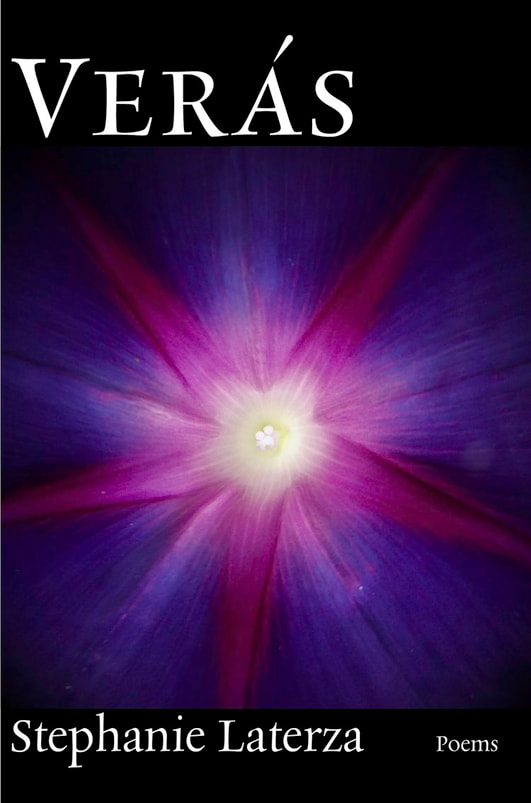|
Verás by Stephanie Laterza. (A book review by Kristy Snedden) In her new book of poetry, Verás, feminist Stephanie Laterza explores themes of family, loss, anger, and intergenerational trauma through the lens of social justice and contemplates grief on a personal and universal level. Her writing is courageously honest, laced with outrage and tenderness, and this is a collection to be celebrated. Her first poem, “Más allá,” sets the stage when Laterza speaks of making masa …whenever she decides whenever she needs to make sense of anything before anyone wakes to ask her for everything… and transitions to speak of “Abuelita” who …did it so many times…Thirteen survived and the priests said she should be grateful even when years later she declared what had happened to her was the real sin… and zings us with this true and heart-breaking line …till I learned, as she did, that the longer you live the longer you lose. Laterza’s command of language gives us concrete detail woven into lyrical language(s) that convey the complexities of family relationships in the context of the grossly unjust America that is today’s landscape. Laterza doesn’t shy away from the pain and anger of the mother waiting for word of her son in an emergency room. With lines like …adrenaline burning a mother’s eyes awake, …ribs battered with the sound we read and are feeling from the inside of the mother, instead of looking at the mother. In this way, Laterza draws us into her world, a world where one child can go home, another cannot. In the following stanzas, Laterza paints pictures of well-publicized murders that have occurred in our neighborhoods, homes, schools, and world-wide, then delivers the harsh truth, saying, “There could never be a metaphor as clear as those pictures.” In these poems that tell related bits of stories Laterza celebrates the tentative connections between humans (“For My Neighbor”) and confronts head on the heartless ICE policies (“Hell is Ice”), again convincing us to keep reading with her seemingly effortless use of metaphor and imagery. These poems are infused with righteous anger and grief as well as the vulnerability of being human. Laterza includes a beautiful pantoum that starts off with, “Plenty folks would say my father didn’t teach me nothin’” and ends with “Plenty folks should know my father didn’t teach me nothing.” In between is a slow undressing of lessons learned. This poem is followed by a love poem to her son, and we begin to see the unfolding of generations. In “Cosma e Damiano” Laterza takes us deeper into her relationships with her father and extended family and her experiences of grief. Who among us won’t resonate when she writes, “I wouldn’t understand till much later what it means to lose//the only places and people you’ve ever called home.” In “My Father in Heaven” Laterza muses on blessings and abundance and shows the sweetness that can come after/during grief with lines like, “and the flaming sunrise that floods the sky pink/ each morning I would like to believe is you/visiting” and there are more blessings in “Piano Fingers” with lines like “Peanut butter is no longer allowed in schools and I don’t know how or why/peanuts went wrong and I survived.” In other moments Laterza writes of being a “latchkey kid” and displays her vulnerable toughness with lines like “…she would sit before the box screen TV Daddy/won from church bingo/so Woody Woodpecker, Laura Ingalls, and Mr. Rogers could watch her.” There are more poems here about family, being a child, and parenting a child that must be savored to be understood on an intuitive level. The final poem, “Verás,” ties together the themes addressed in this beautiful collection. It is a poem rich in imagery, thought and emotion that mingle seamlessly, like old friends. Rest for a moment in these lines, “…had I known then how/ a memory begins as ore rapt in fire,/in waves of salt loam that collects upon the crest of oceans,/composed of every tear broken every second there has ever been/anyone or anything to lose…” and you will have a taste of what waits for you inside the pages of this book. In the end, this collection evokes emotions of anger, despair, sorrow, and confusion, infused with hope, almost like a plant’s tendrils reaching through the dark towards light. This work is multi-layered, evocative, and brilliant. With these diverse poems, Laterza stays emotionally connected as she layers the rich complexities of life with a poet’s eye that is unflinching in its honesty and vulnerability. In doing so, she speaks with a voice that resonates deeply with what it means to be an American in the 21st century. Stephanie Laterza’s new book, Verás, is available for preoder from Broadstone Books and will be released on July 15th. |
AuthorWrite something about yourself. No need to be fancy, just an overview. Archives
April 2024
Categories |

 RSS Feed
RSS Feed
